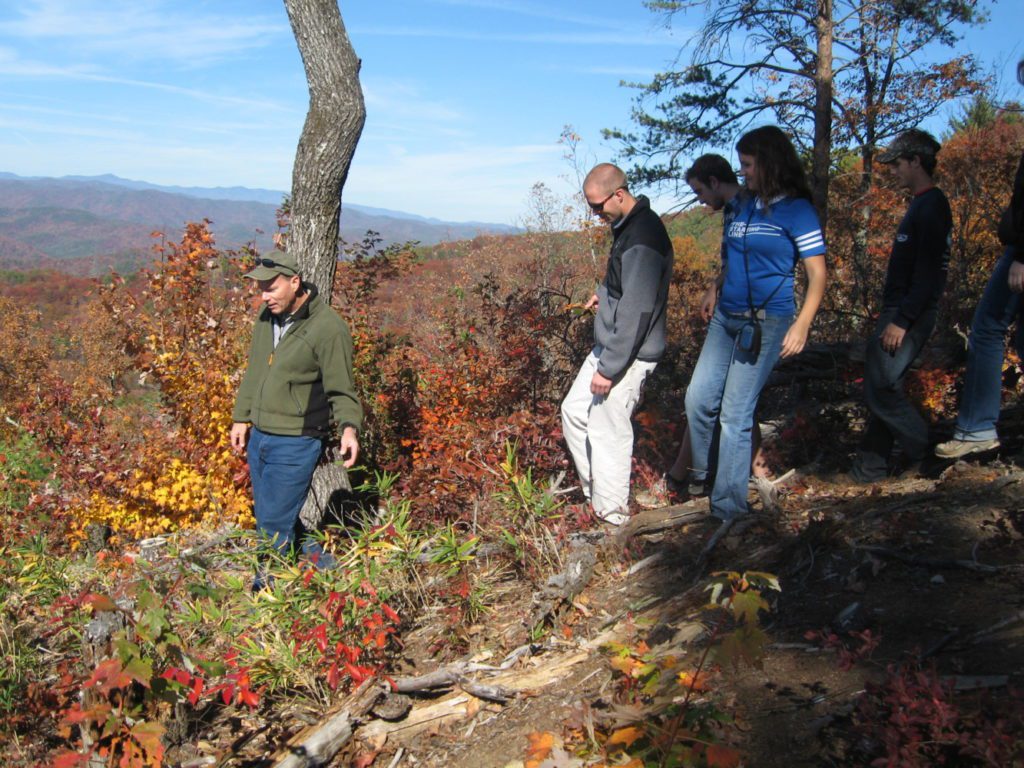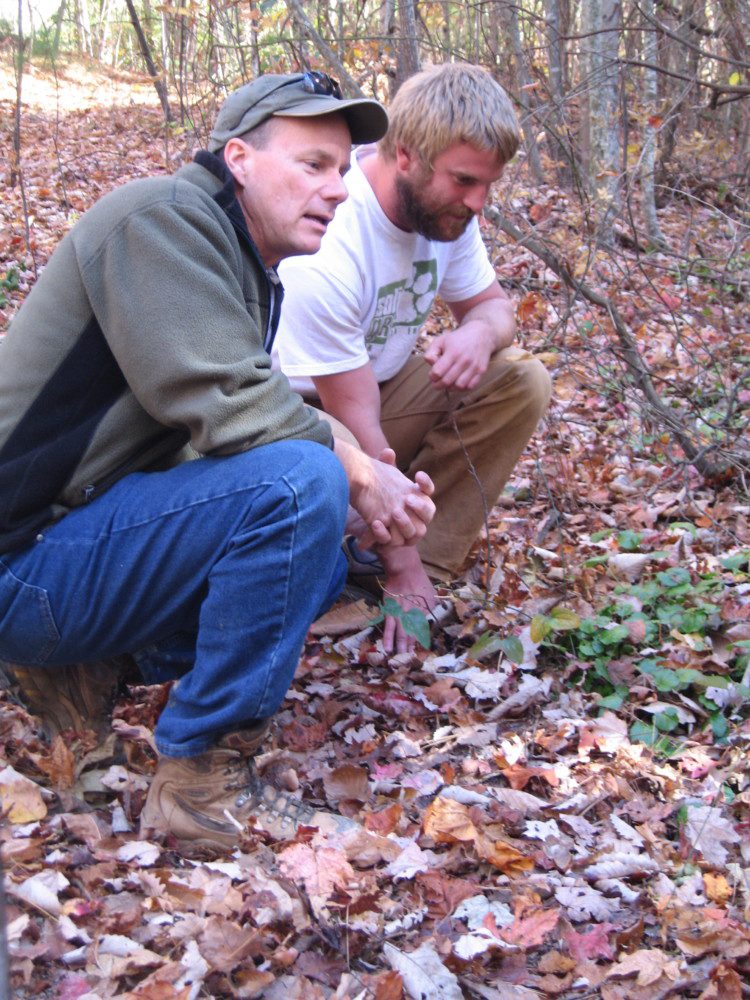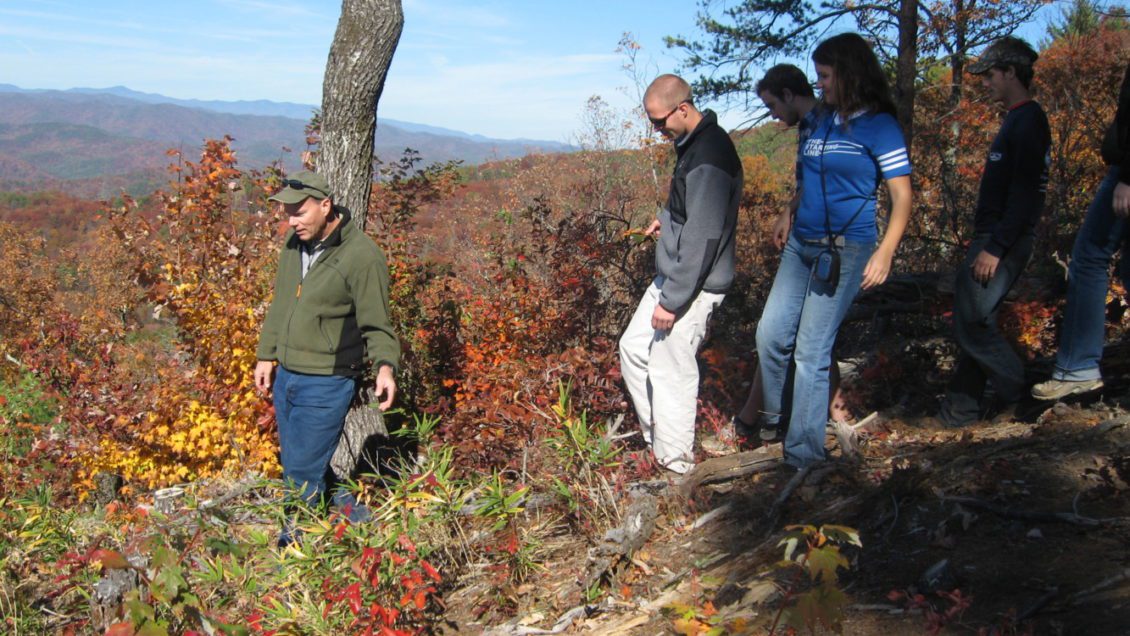Academia can create a cold and competitive culture, but those who know Greg Yarrow say he is proof positive that it isn’t a requirement.
Excellence in university faculty might be measured in many ways — by knowledge imparted, by research conducted, by initiatives pushed forward — and those points all come up when students and colleagues are asked about Yarrow, professor and former chair of Clemson University’s Forestry and Environmental Conservation Department.

Just as frequently, however, those same people will talk about Yarrow’s belief in the power of personal relationships, the inspiration he gave them to follow their dreams and his wisdom in helping them find the delicate balance between higher learning and life away from campus.
For those reasons and more, Yarrow has been nominated and selected for this year’s Thomas Green Clemson Award for Excellence. The prestigious recognition honors outstanding faculty and staff who have made a significant contribution to academic life at Clemson.
For former students, such as Cady Sartini, for whom Yarrow served as the graduate advisor for her Ph.D. program, the honor comes as no surprise.
“I’ve come to realize that he is probably one of the absolute most influential people in my life,” said Sartini, now an assistant professor of wildlife ecology at University of Wisconsin-Stevens Point. “He was so much more than an advisor — he was a true role model for me. It took me a while to realize this while I was still a student, but it was his passion for teaching, for hands-on learning and his drive to get students out in the field that pushed me to become a university professor myself.”
Sartini recalled her graduate program with Yarrow being about much more than producing a dissertation, saying she also influenced by experiences such as serving as a teaching assistant and an undergraduate mentor.
“Just as important, beyond experiences, Greg showed me how to be a successful and satisfied professional — and still put family, friends and personal time first,” she said. “I truly believe that if I can do half as good of a job as he does every day at balancing personal and professional expectations, I will be living a full and complete life in service of students, wildlife conservation, and myself.”
The Thomas Green Clemson Award includes a monetary award, while Yarrow’s name will be added to the plaque that is on permanent display in the lobby of the R.M. Cooper Library. Along with the award, a donation to the Libraries will be given in Yarrow’s honor to purchase new materials to be added to the Libraries’ collection.
Yarrow said he was humbled and honored to receive the award, pointing to many other faculty and staffers making a significant difference at Clemson every day.
“Clemson is a very special place unlike any other … the family atmosphere of students, staff, faculty and the leadership of the university working together creates a wonderful place to learn and grow for our students,” Yarrow said. “Parents entrust us with their sons and daughters for four years — or longer for graduate programs — and as faculty it’s a privilege to provide an educational experience that allows our students to thrive and succeed and go on to be become productive citizens, making an impact across the world and always being a part of our Clemson family.”

And those who’ve studied under Yarrow say he played a major role in making Clemson a special experience to them. For recent graduate Anaston Broome, Yarrow was as a mentor during her undergraduate work, and she plans to continue working with him as a graduate assistant this fall.
“Dr. Yarrow has made a huge impact on my life in so many ways,” Broome said. “He has encouraged me to pursue the field of wildlife and fisheries biology and strive for a top-notch education and, although this is important to him, he also relates to students on a personal level and helps them find what they are passionate about.”
Broome recalled a field trip with classmates to the South Carolina coast during which Yarrow invited students to gather together and talk about their dreams for future work.
“He gave advice to each of us and helped us make connections with people who could help us achieve those dreams,” she said. “I think it is awesome that he connects with his students and takes the time to get to know who they are as a person rather than just a student. There are so many students who look up to him for advice and see him as a role model. He works so hard at what he does and always says that the world of wildlife is constantly changing, therefore we must always keep learning.”
As Broome alluded, word of Yarrow’s personable reputation tends to spread from one class of students to the next.
Patricia Whitener said she often heard Yarrow’s name spoken with warmth and appreciation as an undergraduate, but it wasn’t until she began her graduate work that she really got a chance to benefit from his guidance.
“Even though Dr. Yarrow was not my advisor, he was always available for me whenever I need to vent or needed guidance or just a moment to check-in,” said Whitener, who now works for Clemson Extension as the Greenville County 4-H Youth Development Agent. “Greg is that way with all the students. I don’t know how he got anything done with the constant stream of folks in and out of his office.”
Whitener cited an example from her final semester at Clemson of Yarrow taking the time to help her practice interviewing for jobs and offered advice on how to negotiate a salary.
“He taught me the power behind and the value of personal relationships — honest-to-goodness, down-to-earth, genuine relationships,” she said. “That can be a rare thing sometimes in the ‘publish or perish’ world of academia. Greg’s true gift was in highlighting the gifts of others.”

Yarrow did that, Whitener said, by always looking for ways to encourage and highlight the strengths of his colleagues and students.
“Greg is a collaborator and as such was able to create some amazing educational and personal experiences for all kinds of people far beyond just the walls of Lehotsky and the campus of Clemson University,” she said. “Dr. Yarrow showed me how to think bigger about natural resource projects and to invite industry to be a part of the solution.”
And at a land-grant institution such as Clemson, involving industry and other stakeholders from the state in bringing the research and education gleaned from the university into the public sphere is no small part of the equation.
Nemours Wildlife Foundation president and CEO Ernie Wiggers has known Yarrow for most of his 40-year professional career but began working closely with him in 1999 when Wiggers took his current role.
“The foundation helps support graduate students’ research projects, and we hire lots of undergrads to serve as interns on these projects,” Wiggers said. “Through the past two decades we have supported several of Greg’s students and, more importantly, he has helped us find some fantastic interns who later became graduate students. Greg also reached out to me for my input when he was developing the proposal to establish the Kennedy Waterfowl and Wetlands Research Center. I very much appreciated that opportunity.”
And helping students find internships and job opportunities within their desired industry has been a key component of Yarrow’s time at Clemson, as many of his former pupils now hold significant roles in state and federal agencies.
S.C. Department of Natural Resources Deputy Director Emily Cope met Yarrow as an undergrad and then served as a work-study student under him in the Clemson Extension Wildlife program.
Cope said Yarrow graciously provided her a project and assistantship that allowed her to pursue her master’s degree and, since graduating from Clemson, she has continued to work with him in partnerships between the university and SCDNR as well as the South Carolina chapter of The Wildlife Society.
“He has always been a dear friend and mentor,” she said. “I learned so much from Dr. Yarrow not only about wildlife management but also, and probably more importantly, about how to approach challenges with optimism and courage. He always treats others with professionalism, respect and kindness and thereby sets an example for his students and colleagues.”
Yarrow is passionate about ensuring the Forestry and Environmental Conservation Department is providing the resources needed to ensure students are well prepared to enter the workforce, Cope said.
“We all owe Dr. Yarrow a huge debt of gratitude for his efforts to rebuild this program after significant budget cuts,” she said. “I will be forever grateful to Dr. Yarrow for the opportunities he provided me at Clemson and for how he has continued to encourage, mentor and support me throughout my career.”
And Yarrow hasn’t just influenced those helping to guide state agencies charged with protecting natural resources, but those helping federal agencies do the same.
Keenan Adams, for example, who earned a doctorate in wildlife biology in 2010 and a master’s in forest resources in 2007 from Clemson, was named in December forest supervisor of the El Yunque National Forest in Puerto Rico for the U.S. Department of Agriculture Forest Service.
“(Yarrow) would always make time to just talk and engage with me, even though I wasn’t his student, nor was he on my committee. We got along so well that I helped him as a teaching assistant,” Adams said.
During that time, Adams said Yarrow taught him was a “lesson in vulnerability.”
“In academia, it is very normal to try to keep a distance between student and professor,” he said. “But Greg opened up and talked about a difficult situation — this taught me the power of being vulnerable and how it develops trust. It was a valuable lesson for me to learn, and I apply it all the time as a leader. He has continued to keep in touch with me after I’ve left, which means a lot to have someone still care about your life’s progress.”
And that personal touch and caring ensure Yarrow will leave a legacy at Clemson that extends well beyond having his name permanently engraved on a plaque in the library.
Get in touch and we will connect you with the author or another expert.
Or email us at news@clemson.edu

